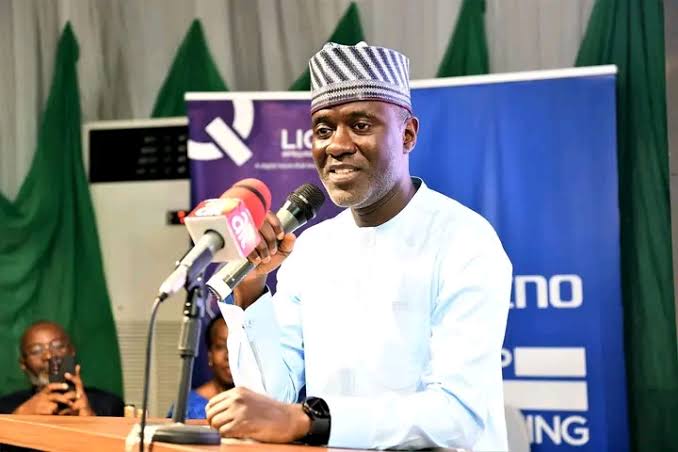News Investigators/ The Nigerian Communications Commission (NCC) has raised alarm over the increasing damage to telecommunications infrastructure nationwide, revealing that Nigeria currently records an average of 1,100 fibre cut incidents weekly.
The Executive Vice-Chairman of the NCC, Aminu Maida, said this during a Critical National Information Infrastructure (CNII) and Sustainability Conference in Lagos on Thursday.
The event was organised by the Nigeria Information Technology Reporters Association (NITRA) in collaboration with the Association of Licensed Telecom Operators of Nigeria (ALTON).
It had the theme: “Critical National ICT Infrastructure and Industry Sustainability, Way Forward.”
Mr Maida, who was represented by Mr Edoyemi Ogoh, Director, Technical Standards and Network Integrity Department, NCC, said the commission also recorded 545 cases of access denial and 99 cases of theft on a weekly basis.
He said that these incidents threatened service delivery, operational stability, and national security.
“These are not just numbers. They reflect a national emergency. Every fibre cut, every theft, and every case of sabotage contributes to dropped calls, failed transactions, interrupted emergency services and economic losses.
He added that the damages had become a major barrier to sustaining the country’s digital economy, which relied heavily on resilient telecom infrastructure.
“Our fibre networks, towers, and data centres are the digital lifelines of the Nigerian economy. Any disruption to them has far-reaching consequences,” he said.
Mr Maida stressed that the affected infrastructure had been designated Critical National Information Infrastructure (CNII) by President Bola Tinubu under Section 3 of the Cybersecurity Act, placing a national security responsibility on all stakeholders, including operators, service providers, civil society and citizens.
To address the situation, he said that the NCC had adopted a multi-layered approach, combining technical enforcement, mediation, public sensitisation and stakeholder engagement.
The Commission, he said, was already enforcing compliance with technical standards on infrastructure deployment, including the laying of fibre-optic cables and construction of telecom towers.
“A nationwide awareness campaign is also underway to educate the public on the dangers of vandalism, fibre cuts, and theft, with messages broadcast through radio, social media and multimedia channels.
“We are ensuring Nigerians understand that damage to telecom infrastructure affects not just big companies, but ordinary people who depend on mobile services, ATMs, hospitals and security alerts,” Maida said.
He added that collaboration with the Office of the National Security Adviser (ONSA) was key to aligning telecom infrastructure protection with the nation’s broader security architecture.
The NCC boss further identified access denial to base station sites as a growing challenge, noting that in many cases, operators were prevented from conducting essential maintenance and operations, thereby prolonging network outages.
He noted that the situation was further compounded by Right-of-Way (RoW) bottlenecks, complex and delayed permit processes, and the rising cost of operations due to heavy reliance on diesel-powered generators.
“The security situation in parts of the country also poses a real barrier to safe and timely maintenance of telecom sites,” he noted.
Also, Gbenga Adebayo, Chairman, Association of Licensed Telecom Operators of Nigeria (ALTON), called on telecom operators to take greater responsibility in protecting their infrastructure before seeking government intervention.
Mr Adebayo, who spoke at the stakeholder forum on Critical National Information Infrastructure (CNII), said it was unacceptable that some telecom sites lacked even the most basic security measures such as perimeter fencing, locks or surveillance systems.
He stressed that the industry must lead by example in safeguarding its assets.
“The ease with which stolen telecom components such as generators, batteries and cables are being sold openly in local markets is also of concern.
“It is a thriving black market that encourages continued vandalism,” the ALTON boss noted.
He said that some of the thefts were carried out by insiders who know the system, and the ready market made it easier for them to sell the stolen goods.
Mr Adebayo also highlighted the lack of coordination between telecom operators and government contractors, particularly during road and utility construction.
He said that such disjointed operations often resulted in accidental fibre cuts, leading to service disruptions and financial losses for operators.
He emphasised the need for stronger enforcement and prosecution of offenders, noting that without deterrent measures, the cycle of vandalism would continue.
Mr Adebayo maintained that those caught in possession of stolen infrastructure must face the full weight of the law to discourage others.
In his remarks, Mr Chike Onwuegbuchi, President, Nigeria Information Technology Reporters Association (NITRA), called for a telecom infrastructure protection trust fund, citing the success of the government’s security trust fund model.
He expressed concern over the prevalence of vandalism and its impact on local communities and essential services.
“Some people see telecom infrastructure as scrap they can sell for quick cash. We must educate our people and show them how such actions affect their own access to services,” Onwuegbuchi said.
He also urged operators to take greater ownership of infrastructure protection and not leave the responsibility solely to the regulator.
NAN


